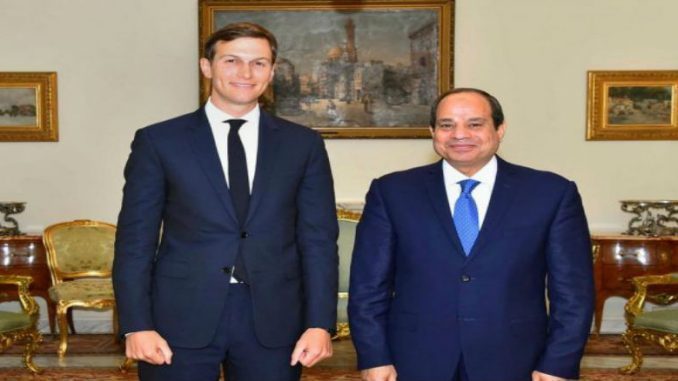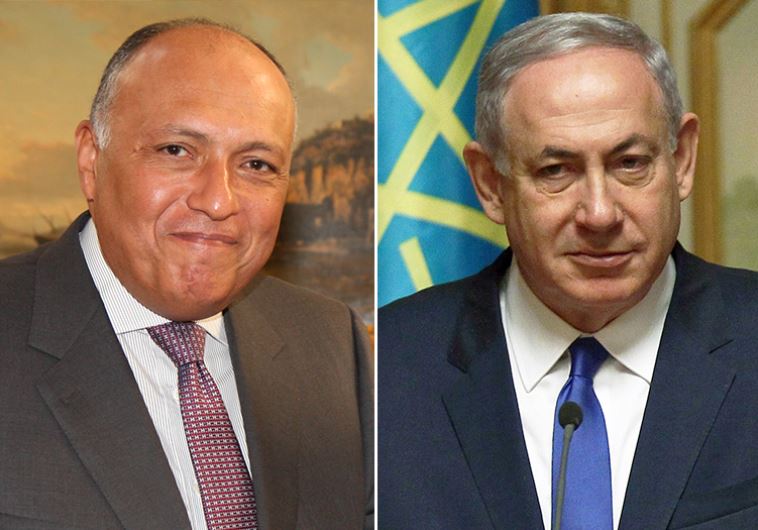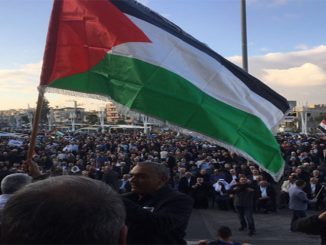
Jared Kushner, United States President Donald Trump’s son-in-law and senior advisor, and Jason Greenblatt, Trump’s special envoy to the Middle East, concluded their visit to Cairo.
The US delegation’s brief time in the Egyptian capital was spent in talks with Egypt’s Abdel Fattah al-Sisi, according to a statement released by Egypt’s Office of the President. The meeting between Sisi, Kushner, and Greenblatt was also attended by Foreign Minister Sameh Shoukry and acting General Intelligence Service Director Abbas Kamel.
In a short statement released on Thursday addressing the meeting in Cairo, the White House noted that the US delegation “discussed increasing cooperation between the United States and Egypt, the need to facilitate humanitarian relief to Gaza, and the Trump administration’s efforts to facilitate peace between the Israelis and [the] Palestinians.”
Office of the President spokesperson Bassam Rady provided further details in his own press release, stating that Sisi reaffirmed during the meeting “Egypt’s support for international efforts and initiatives aimed at achieving a just and comprehensive settlement, in accordance with agreed international terms and on the basis of a two-state solution, according to 1967 borders, in which East Jerusalem is the capital of the state of Palestine, as reiterated by Egypt’s efforts to complete the process of Palestinian reconciliation, calm the situation in Gaza and alleviate the suffering of the population, including the opening of the Rafah border crossing throughout Ramadan.”
The delegation left Cairo on a special aircraft bound for the Qatari capital of Doha, as part of a regional tour that included Jordan, Saudi Arabia and Israel and was primarily focused on informing the leaders of these countries of the defining features of Trump’s initiative — known to the media as “the deal of the century” — to resolve the Palestinian-Israeli conflict.
The announcement of the deal has been postponed several times and still does not have a timeline. The projections, however, are that the announcement will be made before the end of the summer.
The tour did not include a visit, however, to the Palestinian Authority (PA), which cut off contact with the US after Trump’s December announcement to recognize Jerusalem as the capital of the state of Israel.
Egyptian, US and European diplomatic sources stated that the deal includes security and economic arrangements on the border between Egypt and the Palestinian territories and the Egyptian-Israeli border, as well as several projects in Sinai that are expected to be “central” to the deal, which the White House seeks to propose as the final resolution to the Palestinian issue.
Nonetheless, the sources said that, while there have been shows of a preliminary endorsement for the deal from the US’s Arab allies, including those in Cairo, a declaration of a resolution to the conflict will remain difficult without addressing the political process.
According to these sources, the US’s concept involves the construction of a joint port on the Mediterranean between the Egyptian and Palestinian cities of Rafah. This would act as a prelude to extensive economic activity, for which North Sinai would serve as a hub, and would include five principal projects that would be funded by Saudi Arabia and the United Arab Emirates, with a labor force that would be two-thirds Palestinian from the Gaza Strip and one-third Egyptian.
The sources also said that locating these projects on Egyptian territory was an Israeli condition, as they would be under the security protection of Egypt, which would undertake monitoring the passage of individuals between the Gaza Strip and the new industrial zone.
According to the US source, it would constitute “a free zone that connects Egypt and Gaza, and brings about a significant economic boom for the Gaza Strip, while contributing to the development endeavors in Sinai.”
This was supported by several media reports that were published in the Israeli media over the past few days, conveying details on the US-proposed deal — which focuses on improving the humanitarian and economic situation in Gaza — as disclosed by Arab and Israeli sources.
The Israeli newspaper Haaretz quoted sources as saying that the energy supply crisis in the besieged strip is sought to be tackled first. One option being discussed is a solar energy plant that would be built to the west of the Egyptian border, near the city of Arish. According to the Haaretz report, “among long-term projects […] would be the construction of a port in northern Sinai and the building of a […] water desalination plant,” as well as other projects in North Sinai, with funding from the Gulf. “Such undertakings could create jobs for thousands of [Palestinians in Gaza,]”the report reads.
The Egyptian government has made no comments on these statements.
However, PA spokesperson Nabil Abu Rdeineh criticised the deal on Monday. “The Palestinian leadership and our people will not recognize the plans of the US administration and Israel with respect to disconnecting the Gaza Strip and the West Bank under the pretense of ‘humanitarian aid to the Gaza Strip,” he said.
This framing, Abu Rdeineh added, “aims at undermining the national project — which is to terminate the occupation and establish a state with East Jerusalem as the capital — and reduce the Gaza matter to a humanitarian issue.”
A European diplomat who works in the region said that over the course of this week, the US delegation repeatedly heard a certain reservation from officials at the Arab countries it toured: economic and security arrangements alone are not a substantial enough proposal to be presented to the PA and Arab peoples as a resolution to the Palestinian cause, and there is a definite need for a political process that ultimately yields the declaration of a Palestinian state.
Following the talks conducted by Kushner in Amman, a diplomat said that the Jordanian monarch expressed “extreme wariness about the US’s approach, which involves Israel retaining complete control over Jerusalem, while allowing special arrangements for Palestinian and other Muslims to enter the holy sites, as well as maintaining Israeli security control over the Jordan Valley.”
An Arab diplomat, who spoke to Saudi Foreign Ministry officials this week, said that Saudi Crown Prince Mohammed bin Salman’s zeal for supporting the “deal of the century” is paralleled by wariness that Riyadh will have to voice, as King Salman bin Abdul Aziz is not equally keen on the deal, which some of his advisers warn him will involve enormous political concessions that may invite wide-scale Palestinian and Arab criticism of Saudi Arabia and the monarch himself.
While the US’s Arab allies, especially those in Cairo and Abu Dhabi, exhibit preliminary endorsement to the efforts made by Trump’s team and have expressed their willingness to continue to pressure the PA to come back to the table and respond seriously to the new deal — at least as a basis to reach an ultimate solution — an Egyptian diplomat who is well-informed about the talks asserts that “it will be difficult for everyone in the Palestinian Authority or the Arab states to declare […] a resolution to the issue in the absence of a larger political context that addresses all final-status issues.



